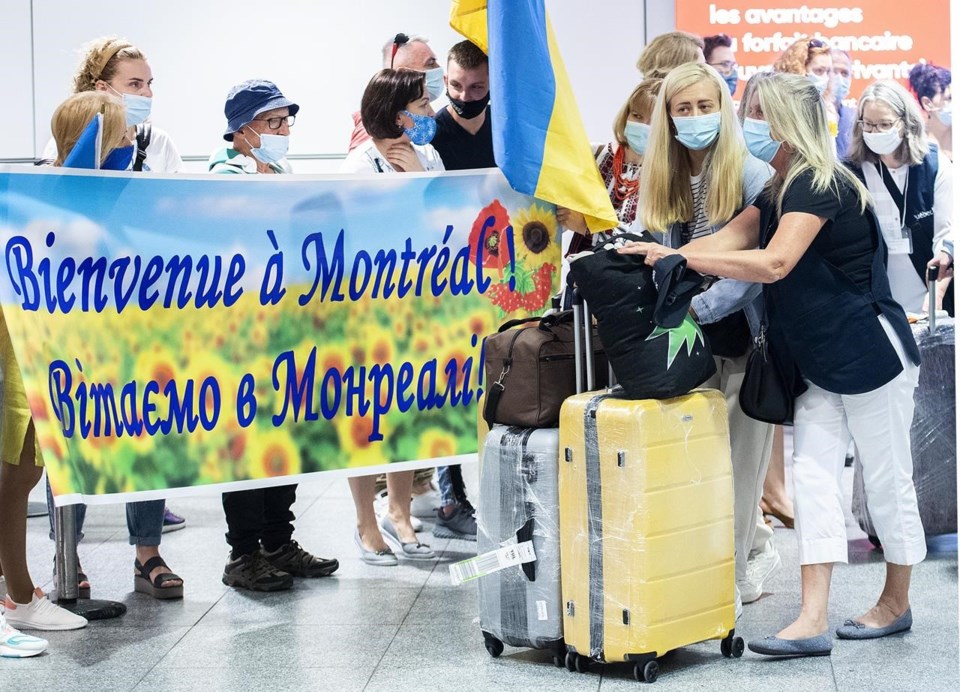OTTAWA — As Russian tanks rolled into Ukraine from the north and south of the country last year and rockets rained down across the county, hundreds of thousands of people made for the borders to escape.
Many had just hours of notice and left with a handful of belongings as they boarded crowded trains or joined massive convoys of citizens headed for safety.
Few likely expected to be away from their homes for more than a year, but some are now considering the prospect of putting down roots elsewhere.
A long-awaited program to grant permanent residency to Ukrainians with familial ties will be realized soon, Immigration Minister Sean Fraser said Monday, but a similar program for other Ukrainians is unlikely to be available for another year or more.
Ottawa will need to co-ordinate with the Ukrainian government if it plans to offer Ukrainians a permanent place in this country, McGill Institute for the Study of Canada director Daniel Béland said.
Offering permanent residency could signal a lack of optimism about Ukraine's ability to beat the Russian military out of its sovereign borders.
"I think this is something that certainly should involve a discussion with Ukrainian government," Béland said. "At the same time, we don't know how long this conflict will be. It's unlikely to end any time soon."
Ukrainian President Volodymyr Zelenskyy has spoken many times about the importance of Ukrainians returning home after the war to help rebuild the economy.
More than 8.2 million Ukrainians have left their home country since the start of the Russian invasion in February 2022.
Canada took the unusual step last year of offering temporary refuge to an unlimited number of Ukrainians fleeing the war. Though they are not afforded the same status or supports as permanent refugees, they are allowed to work and study in Canada for up to three years, and can apply to extend their temporary stay.
The government also promised a family reunification program for Ukrainians that would offer those with familial ties to Canada permanent residency status, but that has yet to be realized.
Canada has received more than a million applications for the temporary emergency visa. Of those, 747,647 were approved as of May 30, and roughly 230,665 people have actually made the journey to Canada.
"We want to, generally, encourage the eight to 11 million people that fled to go back and rebuild," said Ihor Michalchyshyn, CEO of the Ukrainian Canadian Congress.
It's not clear how many people who have come to Canada would prefer to stay, versus returning to Ukraine when it is safe.
There is a "push and pull" in Canada's immigration policy, Michalchyshyn said, between recognizing that some desire to put down roots while maintaining hope for Ukraine's long-term future.
His organization has advocated for the family reunification program, but hasn't taken a position on permanent residency for Ukrainian refugees writ large.
"We've been hearing from the Ukrainian community in Canada that family reunification for people who are here now with their families is going to be a priority, so they can remain connected to their families," Immigration Minister Sean Fraser said Monday.
Those who don't have family ties to Canada can still apply for permanent residency through traditional immigration streams, Fraser said.
The government doesn't have a good grasp yet of how many of those people want to stay in Canada.
"Over the next year or two I will be able to better assess whether the existing programs service those needs or whether we need to do further thinking," he said.
The longer the war goes on, the more pressure Canada will be under to provide a permanent home for Ukrainians who fled, Béland said.
"It will provide more certainty, obviously, to these people so I think it's the right thing to do, considering the fact that there is no end in sight for this war," he said.
Prime Minister Justin Trudeau made a surprise visit to the Ukrainian capital city of Kyiv this weekend, where he pronounced that "Canada will continue to stand with Ukraine with whatever it takes, as long as it takes."
"You're fighting for your country and for values like democracy, freedom, respect and dignity. And in fighting for Ukraine, you're also fighting for the future of us all," Trudeau told Zelenskyy in a press conference Saturday.
This report by The Canadian Press was first published June 12, 2023.
— With files from Bill Graveland in Kyiv, Ukraine.
Laura Osman, The Canadian Press



